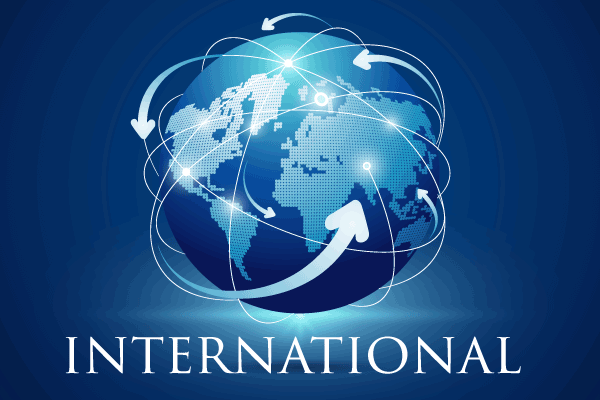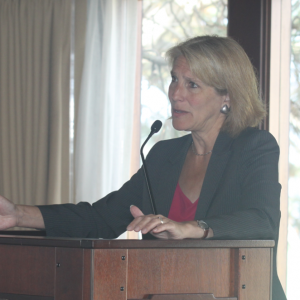 Europe’s importance to both the United States and California was the focus of a recent California Chamber of Commerce international breakfast.
Europe’s importance to both the United States and California was the focus of a recent California Chamber of Commerce international breakfast.
Featured speaker Dr. Karen Donfried, president of the German Marshall Fund of the United States, emphasized to breakfast attendees the need to “double down” on the transatlantic relationship “because it really matters to us. It’s critical that we as the United States continue to be the leader in this relationship.”

Strong Economic Connection
She reminded attendees that the U.S.-European Union economic relationship remains the world’s largest, accounting for a third of total trade in goods and services, nearly half of global output with transactions of $2.7 billion daily. Transatlantic trade and investment, she said, is directly responsible for 6.8 million jobs, promoting economic prosperity on both sides of the Atlantic Ocean.
Europe matters to California, as well, she noted. EU nations are the destination for 17.6% of California exports (more than $29 billion in 2015), she said. Among the states, California ranks No. 1 in jobs provided by European affiliates, with investment generating 378,000 jobs, and 33,000 of the new jobs between 2006 and 2015.
Europe Under Stress
Europe today is under stress due to a confluence of crises that have yet to be resolved, Donfried said, including:
• The Eurozone crisis, sparked by the financial crisis in 2008. Although 19 of the 28 EU member states have the euro as a common currency, Donfried said, there always was speculation that having a monetary union without a common fiscal policy might be problematic. The multiple bailouts for Greece are one symptom of the Eurozone difficulties, she commented.
• Russia’s change in its approach to Europe, marked by its “illegal annexation” of Crimea. Moreover, the refugee and migration crisis exacerbated by the civil war in Syria, has led to tension because not all EU nations are willing to accept refugees.
• The threat of terrorism on the European continent, exemplified by the tragic attacks in France and Belgium, has generated fear fueling the growth of populism across Europe.
• Brexit: Because the United Kingdom is the second largest economy in Europe, the British public referendum on June 23 with 52% expressing a preference to leave the EU was a serious blow to the European Union.
Transatlantic Relations
Because of the confluence of crises in Europe, transatlantic relations matter even more today, Donfried said, describing the Transatlantic Trade and Investment Partnership (TTIP) as the one proactive transatlantic project.
TTIP would boost both U.S. and European growth, she said, but there are barriers to moving forward.
• During the U.S. presidential campaign, both major party candidates have voiced opposition to another trade agreement, the Trans-Pacific Partnership (TPP), and a key congressional leader has said the TPP will not be taken up this session. With TPP being the first agreement to be signed, it might be difficult for TTIP to leapfrog ahead, Donfried said.
On the other hand, labor and environmental issues—frequently the focus of Democratic opposition to trade agreements—don’t exist with TTIP because European standards are higher than U.S. ones, she commented.
• But European politics on TTIP have gotten more complicated, according to Donfried. When the first of the 14 rounds of TTIP negotiations began in 2013, the UK and Germany were the two key champions of the agreement. France had traditionally been more protectionist, she said, and it was hoped that Germany could bring France along.
Now, anti-globalization, anti-European Union and anti-American forces have combined to produce loud public opposition to the TTIP in Germany, said Donfried.
With the UK working on leaving the EU following the Brexit vote, lots of questions remain about the nation’s trade agenda. Although there were hopes that the British could negotiate a separate UK-U.S. trade deal, she said, President Barack Obama was just the latest person to say such an agreement is not likely to happen in the short-term.

